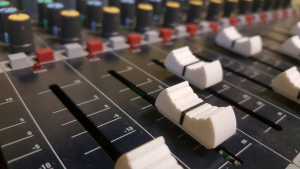When it comes to recording music, laptops can’t be beaten. They’re light, portable, and can play all your favorite music at the push of a button. But when it comes to choosing the right laptop for you, there are a few things to keep in mind.
The versatility of the modern laptop has allowed many to do their work on the go without having to lug around a giant tower. However, this convenience also means there’s more to consider when purchasing a laptop than just size and price. For example, a powerful processor and high-quality sound are important considerations when purchasing a music production laptop.
As a music producer, you need a laptop that’s powerful and can handle the time-consuming work of producing a song. Also, the one which can sync well with your Studio Monitors, microphones, and other instruments. But laptops are not easy to choose from. This is because finding the best music laptop for your needs can be a time-consuming and tricky task.
Tips for choosing a Laptop for a Music Producer?
- Start with the spec – When we’re buying a new laptop, we often start with the spec sheet, but you should never rely on numbers alone to decide which computer will be best for you. We don’t recommend that you buy a laptop from the first shop that you see. Instead, we recommend you start your research by reading our Laptop Buying Guide.
- Budget – When you’re buying a budget laptop, you’re usually not looking for the most powerful hardware or the most top-shelf specs. You’re looking for something simple, something you can use to produce music, edit videos, or do a little designing. If you’re looking for a new laptop, check out our guide to the best budget laptops.
- Design and features of the laptop – Music production is an expensive hobby. A laptop that is easy to use and expandable, with a large monitor, good sound, and excellent software, is a must.
- Software and applications – A laptop is a portable computing device capable of running software and applications. These computers are fairly new in the music production industry and are used by professionals and amateurs alike, who are looking to get their hands dirty on music production. Whether you’re a professional or a beginner, there’s a laptop out there for you.
The key to picking the right laptop for any type of music production is to understand what should be prioritized and how much you are willing to spend. Many of the factors that influence a choice of a laptop for music production involve the type of music you want to create. This can be a very important factor and is often the deciding factor for the choice of music production software. It may not be possible for you to create the type of music you want without a laptop that is well-equipped for music production.
In choosing a laptop for music production, you should also consider the type of music production you want to do.
Many of the laptops that are available to buy as music production laptops are geared towards the recording/producing of drums and bass etc.
Laptops have become a staple for many artists, audio engineers, and video editors, whether they’re recording, mixing, or just editing their music. There are plenty of different laptops for music production, making it hard to know which laptop is right for you. So, the question is, should you get the cheap laptop that’s going to be okay for recording, or the expensive one that will be great for mixing and editing? Well, let’s break it down.
There are a lot of choices when it comes to choosing the right laptop for music production. (It probably doesn’t help that many people don’t even know the first thing about how to create a song or how to record or edit) In this blog post, I’ll go through the tools that every songwriter and producer should have, as well as the features and specs you should look for in a laptop for music production.
Choosing what laptop to use for music production can be a huge decision for an aspiring musician, especially if you have a limited budget. Of course, choosing the best possible laptop does require a lot of research. Still, it’s also essential to consider many other factors, such as the hardware specifications, a laptop’s processing power, the number of ports and inputs, the size of the screen, and the laptop’s durability.



